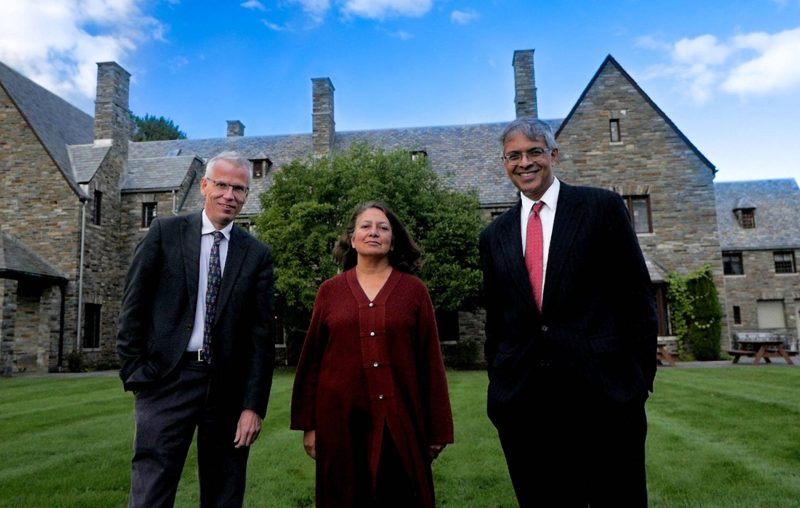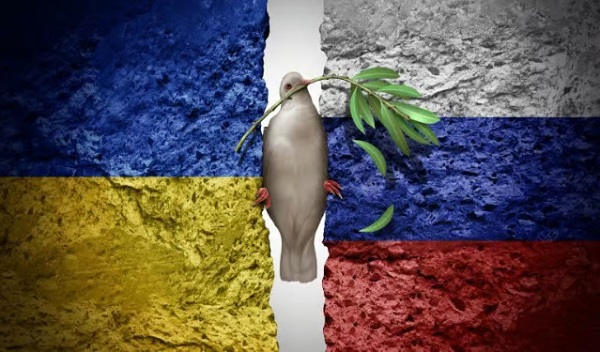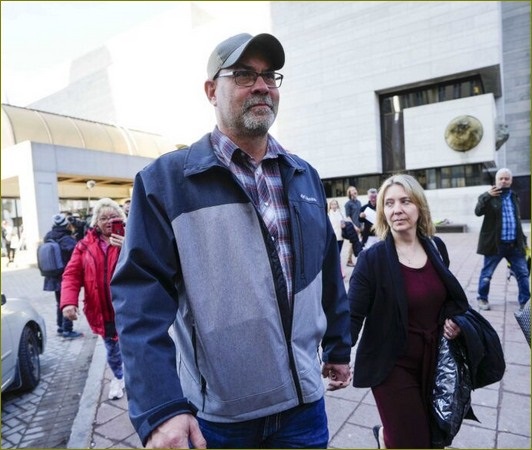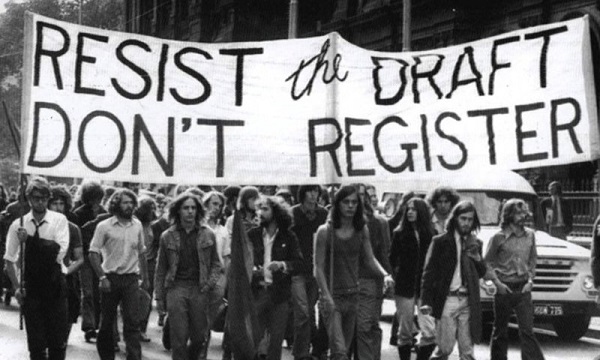Brownstone Institute
Justice Is Served: Jay Bhattacharya Chosen to Be NIH Director

Martin Kulldorff, Sunetra Gupta, Jay Bhattacharya. Authors of the Great Barrington Declaration
From the Brownstone Institute
By
“At some point in summer of 2020, I decided—what is my career for? If it’s just to have another CV line or a stamp, I’ve wasted my life—that I would speak no matter what the consequences were.”
Many years ago, I was at the wedding of a good friend, a guy who everyone seemed to like. He was/is humble, considerate, kind, and down to earth. I remember telling his mother while at the wedding that I would tell anyone that, “If you don’t like him, then the problem is you.”
I also feel that way about Stanford health economist Jay Bhattacharya. Jay’s nomination by President-elect Trump to be Director of the National Institutes of Health has been a long time coming and is a hopeful signal that national health research policy is headed in the right direction.
Jay was right about all the big things during the Covid pandemic and was an important counter to the destructive hubris of lockdown and mandate-promoting public health leaders and scientists in the US. Along with Martin Kulldorff and Sunetra Gupta, Jay took enormous personal and professional risks in drafting the Great Barrington Declaration in October of 2020. In response to the highly age-stratified mortality of Covid-19 and with the threat of serious collateral damage of continuing lockdowns, school closures, and mandates, the GBD instead promoted the policy of focused protection for vulnerable elderly and infirm people while allowing young and healthy people to live their lives.
The virus was going to infect everyone eventually and establish herd immunity, and there was no evidence that a vaccine (none approved at the time) would stop that natural process. The big question was how to deal with a natural disaster without making the situation much worse. Thus, the debate was focused protection versus unfocused protection—sheltering everyone regardless of their risk of mortality or serious disease until the entire population could be vaccinated with a vaccine of unknown efficacy and net benefit.
At least that’s the debate that should’ve happened. Unfortunately, it didn’t. Jay and his GBD coauthors were attacked, threatened, and slandered. When Jay’s research group published a study showing that the seroprevalence of Covid-19 in Santa Clara County in California was much higher than previously believed, it destroyed the delusion that the virus could be eliminated, that containment was at all possible. Many people didn’t want to hear that, and Jay was subjected to numerous attacks in the media, including a defamatory article in BuzzFeed claiming he was funded by dark money and implied he used questionable methods because he was biased toward the study’s outcome.
The fact that he shortly thereafter authored a paper showing very low seroprevalence in Major League Baseball franchises wasn’t enough to prove his objectivity. The message put forth by the public health establishment would simply not allow any dissent or debate. The policy needed to drive The Science™, and lower-case science could not be allowed to drive the policy.
I signed the Great Barrington Declaration the day it was published on October 4th, 2020. I had seen, and was greatly impressed by, interviews of Jay by Peter Robinson in March and April of 2020 and was heartened by Jay’s calm display of knowledge and humility. Jay described in one of these interviews the uncertainty surrounding the number of people infected and the claims being made by experts like Anthony Fauci regarding the infection fatality rate:
They don’t know it and I don’t know it. We should be honest about that. And we should be honest about that with people who make these policy decisions when making them. In a sense, people plug the worst case into their models, they project two to four million deaths, the newspapers pick up the two to four million deaths, the politicians have to respond, and the scientific basis for that projection…there’s no study underlying that scientific projection.
When asked about the potential for collateral damage to lockdowns, “It’s not dollars versus lives, it’s lives versus lives.” An understanding of the responsibility to avoid collateral harm of lockdowns was essential yet was in extremely short supply. Jay was attacked for this nuanced message. He got emails from colleagues and administrators telling him that questioning the high infection fatality rate was irresponsible. Yet, someone had to do it. However, the interviews went viral, because Jay gave millions of people something they didn’t have and desperately needed. He gave them hope.
As the year went on, Jay became the face of the opposition to unfocused protection, appearing in countless interviews and writing countless articles. He became an advisor to Florida Governor Ron DeSantis, who vowed to not lock down the people of Florida again after an initial wave of closures. When waves of Covid inevitably hit Florida, Stanford students papered the campus with pictures of Jay next to Florida death rates, implying Jay’s nuanced message was responsible for the deaths of thousands of people. When the age-adjusted mortality rate of Florida ended up being rather average compared to other states, including lockdown and mandate-happy California, no one apologized.
YouTube censored a public forum with Jay and Martin Kulldorff and Governor DeSantis, where they made claims about the hazards of continuous lockdowns, school closures, and mandates that months before wouldn’t have been at all controversial. After the GBD was published, Jay and Martin were invited to the White House by Covid advisor Scott Atlas to discuss the idea of focused protection with President Trump. Despite that meeting, the political battle continued to be an uphill fight.
The response of federal officials was shameful. Fauci and White House Covid Advisor Deborah Birx boycotted the meeting. Then NIH Director Francis Collins called for a “swift and devastating takedown” of the GBD’s premise and called the authors “fringe epidemiologists.” There simply was no appetite at the highest levels for a nuanced message or any debate whatsoever. Media coverage of Jay and other Covid response critics continued to be toxic.
Yet Jay’s appearances and message continued to inspire millions of people and give them hope. I began writing in support of focused protection and against the constant doom-saying that was harming everyone, especially children. I met Jay in the fall of 2021 because of my writing, at a conference organized by Brownstone Institute. “I think we are making a difference,” he said after shaking my hand. Like many other people he had inspired to take a stance against Covid hysteria, I needed to hear that.
The next day, Jay was preparing to give his speech in front of a small crowd in the ballroom, and I sat next to him while he reviewed his notes during the previous speaker’s talk. Although he was dressed in a suit and tie, when glancing down, I noticed Jay had a hole in his dress shoe. This truly wasn’t about money or even status. He was simply doing what he believed was morally right.
Later on, Jay helped spearhead a couple of Covid-related projects I was also involved in (I was there largely due to his influence). First was the Norfolk Group, which produced a resource document for the US Congress titled “Questions for a COVID-19 Commission” and the second was Florida’s Public Health Integrity Committee formed by Governor DeSantis and led by Florida Surgeon General Joe Ladapo. Both groups attempted to bring accountability for the US public health response, and I believe they were successful in spotlighting just how wrong and harmful lockdowns and mandates were for the very public they were supposed to help.
During the initial Norfolk Group meeting, Jay often talked about the moment of no return, “crossing the Rubicon,” as he put it, the moment that each one of us made a conscientious decision to stand up against the mob. He later recalled in an interview with Jordan Peterson: “At some point in summer of 2020, I decided—what is my career for? If it’s just to have another CV line or a stamp, I’ve wasted my life—that I would speak no matter what the consequences were.”
The world has benefitted from Jay’s crossing of the Rubicon. His nomination, after years in the wilderness and on the “fringe” of public health and health policy, restores a sense that there is in fact justice in the world. Now he moves on to the significant task of reforming health research policy. We should be cheering him on all the way.
And if you don’t like Jay, then the problem is you.
Republished from the author’s Substack
Author
Brownstone Institute
If the President in the White House can’t make changes, who’s in charge?

From the Brownstone Institute
By
Who Controls the Administrative State?
President Trump on March 20, 2025, ordered the following: “The Secretary of Education shall, to the maximum extent appropriate and permitted by law, take all necessary steps to facilitate the closure of the Department of Education.”
That is interesting language: to “take all necessary steps to facilitate the closure” is not the same as closing it. And what is “permitted by law” is precisely what is in dispute.
It is meant to feel like abolition, and the media reported it as such, but it is not even close. This is not Trump’s fault. The supposed authoritarian has his hands tied in many directions, even over agencies he supposedly controls, the actions of which he must ultimately bear responsibility.
The Department of Education is an executive agency, created by Congress in 1979. Trump wants it gone forever. So do his voters. Can he do that? No but can he destaff the place and scatter its functions? No one knows for sure. Who decides? Presumably the highest court, eventually.
How this is decided – whether the president is actually in charge or really just a symbolic figure like the King of Sweden – affects not just this one destructive agency but hundreds more. Indeed, the fate of the whole of freedom and functioning of constitutional republics may depend on the answer.
All burning questions of politics today turn on who or what is in charge of the administrative state. No one knows the answer and this is for a reason. The main functioning of the modern state falls to a beast that does not exist in the Constitution.
The public mind has never had great love for bureaucracies. Consistent with Max Weber’s worry, they have put society in an impenetrable “iron cage” built of bloodless rationalism, needling edicts, corporatist corruption, and never-ending empire-building checked by neither budgetary restraint nor plebiscite.
Today’s full consciousness of the authority and ubiquity of the administrative state is rather new. The term itself is a mouthful and doesn’t come close to describing the breadth and depth of the problem, including its root systems and retail branches. The new awareness is that neither the people nor their elected representatives are really in charge of the regime under which we live, which betrays the whole political promise of the Enlightenment.
This dawning awareness is probably 100 years late. The machinery of what is popularly known as the “deep state” – I’ve argued there are deep, middle, and shallow layers – has been growing in the US since the inception of the civil service in 1883 and thoroughly entrenched over two world wars and countless crises at home and abroad.
The edifice of compulsion and control is indescribably huge. No one can agree precisely on how many agencies there are or how many people work for them, much less how many institutions and individuals work on contract for them, either directly or indirectly. And that is just the public face; the subterranean branch is far more elusive.
The revolt against them all came with the Covid controls, when everyone was surrounded on all sides by forces outside our purview and about which the politicians knew not much at all. Then those same institutional forces appear to be involved in overturning the rule of a very popular politician whom they tried to stop from gaining a second term.
The combination of this series of outrages – what Jefferson in his Declaration called “a long train of abuses and usurpations, pursuing invariably the same Object” – has led to a torrent of awareness. This has translated into political action.
A distinguishing mark of Trump’s second term has been an optically concerted effort, at least initially, to take control of and then curb administrative state power, more so than any executive in living memory. At every step in these efforts, there has been some barrier, even many on all sides.
There are at least 100 legal challenges making their way through courts. District judges are striking down Trump’s ability to fire workers, redirect funding, curb responsibilities, and otherwise change the way they do business.
Even the signature early achievement of DOGE – the shuttering of USAID – has been stopped by a judge with an attempt to reverse it. A judge has even dared tell the Trump administration who it can and cannot hire at USAID.
Not a day goes by when the New York Times does not manufacture some maudlin defense of the put-upon minions of the tax-funded managerial class. In this worldview, the agencies are always right, whereas any elected or appointed person seeking to rein them in or terminate them is attacking the public interest.
After all, as it turns out, legacy media and the administrative state have worked together for at least a century to cobble together what was conventionally called “the news.” Where would the NYT or the whole legacy media otherwise be?
So ferocious has been the pushback against even the paltry successes and often cosmetic reforms of MAGA/MAHA/DOGE that vigilantes have engaged in terrorism against Teslas and their owners. Not even returning astronauts from being “lost in space” has redeemed Elon Musk from the wrath of the ruling class. Hating him and his companies is the “new thing” for NPCs, on a long list that began with masks, shots, supporting Ukraine, and surgical rights for gender dysphoria.
What is really at stake, more so than any issue in American life (and this applies to states around the world) – far more than any ideological battles over left and right, red and blue, or race and class – is the status, power, and security of the administrative state itself and all its works.
We claim to support democracy yet all the while, empires of command-and-control have arisen among us. The victims have only one mechanism available to fight back: the vote. Can that work? We do not yet know. This question will likely be decided by the highest court.
All of which is awkward. It is impossible to get around this US government organizational chart. All but a handful of agencies live under the category of the executive branch. Article 2, Section 1, says: “The executive Power shall be vested in a President of the United States of America.”

Does the president control the whole of the executive branch in a meaningful way? One would think so. It’s impossible to understand how it could be otherwise. The chief executive is…the chief executive. He is held responsible for what these agencies do – we certainly blasted away at the Trump administration in the first term for everything that happened under his watch. In that case, and if the buck really does stop at the Oval Office desk, the president must have some modicum of control beyond the ability to tag a marionette to get the best parking spot at the agency.
What is the alternative to presidential oversight and management of the agencies listed in this branch of government? They run themselves? That claim means nothing in practice.
For an agency to be deemed “independent” turns out to mean codependency with the industries regulated, subsidized, penalized, or otherwise impacted by its operations. HUD does housing development, FDA does pharmaceuticals, DOA does farming, DOL does unions, DOE does oil and turbines, DOD does tanks and bombs, FAA does airlines, and so on It goes forever.
That’s what “independence” means in practice: total acquiescence to industrial cartels, trade groups, and behind-the-scenes systems of payola, blackmail, and graft, while the powerless among the people live with the results. This much we have learned and cannot unlearn.
That is precisely the problem that cries out for a solution. The solution of elections seems reasonable only if the people we elected actually have the authority over the thing they seek to reform.
There are criticisms of the idea of executive control of executive agencies, which is really nothing other than the system the Founders established.
First, conceding more power to the president raises fears that he will behave like a dictator, a fear that is legitimate. Partisan supporters of Trump won’t be happy when the precedent is cited to reverse Trump’s political priorities and the agencies turn on red-state voters in revenge.
That problem is solved by dismantling agency power itself, which, interestingly, is mostly what Trump’s executive orders have sought to achieve and which the courts and media have worked to stop.
Second, one worries about the return of the “spoils system,” the supposedly corrupt system by which the president hands out favors to friends in the form of emoluments, a practice the establishment of the civil service was supposed to stop.
In reality, the new system of the early 20th century fixed nothing but only added another layer, a permanent ruling class to participate more fully in a new type of spoils system that operated now under the cloak of science and efficiency.
Honestly, can we really compare the petty thievery of Tammany Hall to the global depredations of USAID?
Third, it is said that presidential control of agencies threatens to erode checks and balances. The obvious response is the organizational chart above. That happened long ago as Congress created and funded agency after agency from the Wilson to the Biden administration, all under executive control.
Congress perhaps wanted the administrative state to be an unannounced and unaccountable fourth branch, but nothing in the founding documents created or imagined such a thing.
If you are worried about being dominated and destroyed by a ravenous beast, the best approach is not to adopt one, feed it to adulthood, train it to attack and eat people, and then unleash it.
The Covid years taught us to fear the power of the agencies and those who control them not just nationally but globally. The question now is two-fold: what can be done about it and how to get from here to there?
Trump’s executive order on the Department of Education illustrates the point precisely. His administration is so uncertain of what it does and can control, even of agencies that are wholly executive agencies, listed clearly under the heading of executive agencies, that it has to dodge and weave practical and legal barriers and land mines, even in its own supposed executive pronouncements, even to urge what might amount to be minor reforms.
Whoever is in charge of such a system, it is clearly not the people.
Brownstone Institute
The New Enthusiasm for Slaughter

From the Brownstone Institute
By
What War Means
My mother once told me how my father still woke up screaming in the night years after I was born, decades after the Second World War (WWII) ended. I had not known – probably like most children of those who fought. For him, it was visions of his friends going down in burning aircraft – other bombers of his squadron off north Australia – and to be helpless, watching, as they burnt and fell. Few born after that war could really appreciate what their fathers, and mothers, went through.
Early in the movie Saving Private Ryan, there is an extended D-Day scene of the front doors of the landing craft opening on the Normandy beaches, and all those inside being torn apart by bullets. It happens to one landing craft after another. Bankers, teachers, students, and farmers being ripped in pieces and their guts spilling out whilst they, still alive, call for help that cannot come. That is what happens when a machine gun opens up through the open door of a landing craft, or an armored personnel carrier, of a group sent to secure a tree line.
It is what a lot of politicians are calling for now.
People with shares in the arms industry become a little richer every time one of those shells is fired and has to be replaced. They gain financially, and often politically, from bodies being ripped open. This is what we call war. It is increasingly popular as a political strategy, though generally for others and the children of others.
Of course, the effects of war go beyond the dismembering and lonely death of many of those fighting. Massacres of civilians and rape of women can become common, as brutality enables humans to be seen as unwanted objects. If all this sounds abstract, apply it to your loved ones and think what that would mean.
I believe there can be just wars, and this is not a discussion about the evil of war, or who is right or wrong in current wars. Just a recognition that war is something worth avoiding, despite its apparent popularity amongst many leaders and our media.
The EU Reverses Its Focus
When the Brexit vote determined that Britain would leave the European Union (EU), I, like many, despaired. We should learn from history, and the EU’s existence had coincided with the longest period of peace between Western European States in well over 2,000 years.
Leaving the EU seemed to be risking this success. Surely, it is better to work together, to talk and cooperate with old enemies, in a constructive way? The media, and the political left, center, and much of the right seemed at that time, all of nine years ago, to agree. Or so the story went.
We now face a new reality as the EU leadership scrambles to justify continuing a war. Not only continuing, but they had been staunchly refusing to even countenance discussion on ending the killing. It has taken a new regime from across the ocean, a subject of European mockery, to do that.
In Europe, and in parts of American politics, something is going on that is very different from the question of whether current wars are just or unjust. It is an apparent belief that advocacy for continued war is virtuous. Talking to leaders of an opposing country in a war that is killing Europeans by the tens of thousands has been seen as traitorous. Those proposing to view the issues from both sides are somehow “far right.”
The EU, once intended as an instrument to end war, now has a European rearmament strategy. The irony seems lost on both its leaders and its media. Arguments such as “peace through strength” are pathetic when accompanied by censorship, propaganda, and a refusal to talk.
As US Vice-President JD Vance recently asked European leaders, what values are they actually defending?
Europe’s Need for Outside Help
A lack of experience of war does not seem sufficient to explain the current enthusiasm to continue them. Architects of WWII in Europe had certainly experienced the carnage of the First World War. Apart from the financial incentives that human slaughter can bring, there are also political ideologies that enable the mass death of others to be turned into an abstract and even positive idea.
Those dying must be seen to be from a different class, of different intelligence, or otherwise justifiable fodder to feed the cause of the Rules-Based Order or whatever other slogan can distinguish an ‘us’ from a ‘them’…While the current incarnation seems more of a class thing than a geographical or nationalistic one, European history is ripe with variations of both.
Europe appears to be back where it used to be, the aristocracy burning the serfs when not visiting each other’s clubs. Shallow thinking has the day, and the media have adapted themselves accordingly. Democracy means ensuring that only the right people get into power.
Dismembered European corpses and terrorized children are just part of maintaining this ideological purity. War is acceptable once more. Let’s hope such leaders and ideologies can be sidelined by those beyond Europe who are willing to give peace a chance.
There is no virtue in the promotion of mass death. Europe, with its leadership, will benefit from outside help and basic education. It would benefit even further from leadership that values the lives of its people.
-

 Daily Caller2 days ago
Daily Caller2 days agoDOJ Releases Dossier Of Deported Maryland Man’s Alleged MS-13 Gang Ties
-

 Daily Caller2 days ago
Daily Caller2 days agoTrump Executive Orders ensure ‘Beautiful Clean’ Affordable Coal will continue to bolster US energy grid
-

 COVID-191 day ago
COVID-191 day agoChris Barber asks Court to stay proceedings against him
-

 2025 Federal Election2 days ago
2025 Federal Election2 days agoBREAKING from THE BUREAU: Pro-Beijing Group That Pushed Erin O’Toole’s Exit Warns Chinese Canadians to “Vote Carefully”
-

 Energy2 days ago
Energy2 days agoStraits of Mackinac Tunnel for Line 5 Pipeline to get “accelerated review”: US Army Corps of Engineers
-

 2025 Federal Election2 days ago
2025 Federal Election2 days agoAllegations of ethical misconduct by the Prime Minister and Government of Canada during the current federal election campaign
-

 Canadian Energy Centre1 day ago
Canadian Energy Centre1 day agoFirst Nations in Manitoba pushing for LNG exports from Hudson’s Bay
-

 Opinion2 days ago
Opinion2 days agoLeft Turn: How Viet Nam War Resisters Changed Canada’s Political Compass









